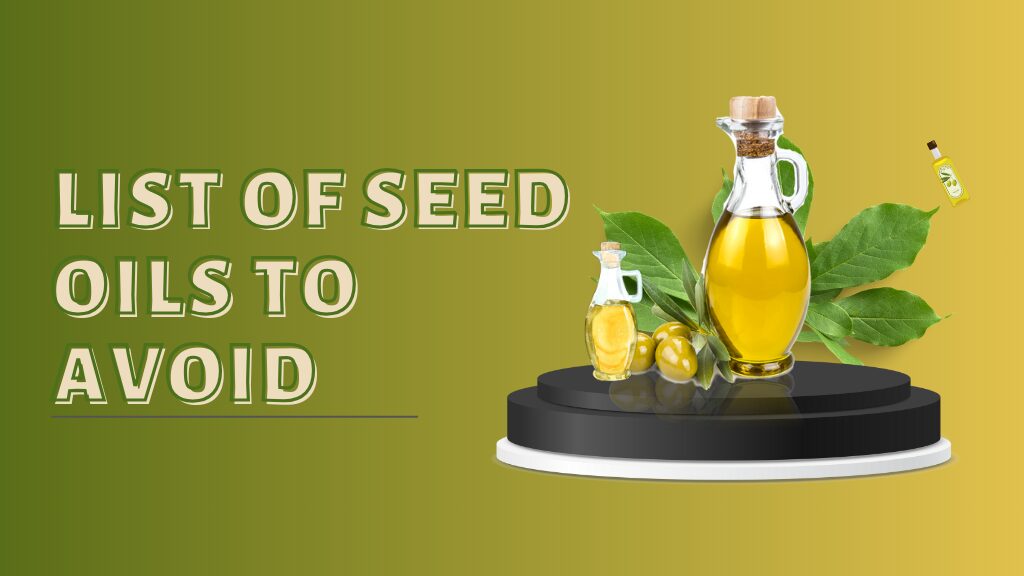When it comes to maintaining good health, the oils we use in everyday cooking play a far greater role than most people realize. Modern diets are flooded with highly processed seed oils that may look harmless but can quietly harm the body over time. Many nutritionists, health experts, and wellness advocates have raised concerns about the effects of these oils on inflammation, heart health, and overall well-being. In this article, we will take a detailed look at the list of seed oils to avoid, explain why they are considered harmful, and provide clarity on healthier choices you can make. By the end, you’ll understand why stepping away from these oils can support a cleaner and more nourishing diet.
Why Seed Oils Became Popular
Seed oils, also known as vegetable oils, became widely used during the 20th century as inexpensive alternatives to animal fats like butter, ghee, or lard. Food manufacturers marketed them as “heart-healthy” options because they contain polyunsaturated fats instead of saturated fats. Their long shelf life and ability to be mass-produced made them the perfect ingredient for processed foods, packaged snacks, and fast-food chains.
However, the process of extracting oil from seeds requires heavy refining, high-heat treatment, and the use of chemical solvents such as hexane. This level of processing strips the oil of nutrients, alters its natural structure, and leaves behind compounds that can cause oxidative stress in the body. The result is a highly unstable oil that may contribute to chronic health issues when consumed regularly.
The Hidden Dangers of Seed Oils
One of the biggest issues with seed oils lies in their omega-6 fatty acid content. While omega-6 fats are essential in small amounts, the modern diet often contains an excessive imbalance of omega-6 compared to omega-3. This imbalance promotes inflammation, a key driver of many health problems such as arthritis, obesity, diabetes, and cardiovascular disease.
Another concern is that these oils oxidize easily when exposed to light, heat, and air. Once oxidized, they form harmful compounds known as free radicals. Free radicals damage cells, accelerate aging, and increase the risk of long-term diseases. Studies also suggest that frequent consumption of industrial seed oils may disrupt metabolic health, impact insulin sensitivity, and play a role in non-alcoholic fatty liver disease.
List of Seed Oils to Avoid
Now that we understand why processed seed oils are problematic, it’s important to know which ones to look out for.
Soybean Oil
Soybean oil is one of the most widely used seed oils in processed foods, fast-food chains, and home kitchens. Its production is highly industrialized, involving chemical solvents and deodorization. Rich in omega-6 fatty acids, soybean oil contributes significantly to the modern diet’s imbalance between omega-6 and omega-3. Long-term consumption has been linked to inflammation, hormone disruption, and potential gut issues.
Corn Oil
Corn oil is another heavily processed oil that might seem innocent because corn is a common staple food. However, the oil extraction process involves refining, bleaching, and deodorizing, stripping away nutrients and producing unstable compounds. Corn oil has one of the highest levels of omega-6 fats, and it oxidizes easily during cooking, releasing harmful byproducts.
Canola Oil
Marketed as “healthy” due to its low saturated fat content, canola oil is far from the natural product people believe it to be. Extracted from rapeseed and then heavily processed to remove erucic acid, canola oil undergoes multiple stages of heating and chemical treatment. Although it contains omega-3 fats, these are often destroyed during processing, leaving behind a pro-inflammatory oil that can harm metabolic health.
Sunflower Oil
Sunflower oil is often promoted as a clean and light cooking oil, but the high-oleic and refined versions sold in supermarkets are very different from the natural product. Refined sunflower oil is unstable when heated and produces toxic aldehydes that can damage cells. Its omega-6 levels are extremely high, which contributes to systemic inflammation when consumed regularly.
Cottonseed Oil
Cottonseed oil is not only refined but also comes from a crop that is heavily treated with pesticides. Unlike edible seeds, cotton is not grown for human consumption, which raises concerns about toxins in its oil. The refining process uses harsh chemicals, and the resulting oil is loaded with inflammatory compounds. Cottonseed oil is often used in margarine, shortening, and processed snacks, making it one of the worst offenders.
Grapeseed Oil
Grapeseed oil is marketed as a gourmet option and often promoted for salad dressings and frying. However, it is one of the most unstable oils because it contains up to 70% omega-6 fatty acids. Its extraction process requires chemical solvents, and the oil oxidizes quickly, releasing free radicals that damage cells and contribute to chronic inflammation.
Safflower Oil
Safflower oil is similar to sunflower oil in terms of instability and high omega-6 content. Although some varieties claim to be “high-oleic” and safer, most commercial safflower oil is refined and highly inflammatory. It is often used in packaged foods and snacks, making it easy to consume unknowingly.
Rice Bran Oil
Rice bran oil has gained popularity in recent years due to its high smoke point, which makes it appealing for frying. However, despite its stability under heat, it remains high in omega-6 fats and undergoes a refining process that strips away antioxidants. Frequent use may contribute to inflammatory health problems, especially when used alongside other seed oils.
Healthier Alternatives to Seed Oils
Avoiding these oils doesn’t mean you have to give up flavor or versatility in your kitchen. Healthier, less-processed fats can provide stability during cooking while also supporting your overall health. Oils such as extra virgin olive oil, coconut oil, avocado oil, and even traditional animal fats like butter and ghee are excellent options. They offer better fatty acid profiles, greater heat stability, and beneficial compounds that nourish the body rather than harm it.
Switching to these oils not only improves the nutritional quality of your meals but also brings back a sense of tradition to cooking. For centuries, cultures around the world relied on stable animal fats, olive oil, or tropical oils for everyday use. These natural fats supported generations of people without the modern epidemic of inflammatory diseases. By going back to these roots, you embrace oils that work in harmony with your body instead of against it. This simple yet powerful shift can transform the way you experience food while supporting long-term wellness.
The Role of Balance and Moderation
It’s important to recognize that the occasional consumption of foods cooked in seed oils will not cause immediate harm. Problems arise when these oils form the foundation of your daily diet, which is the case for many people consuming processed and packaged foods. By focusing on whole foods, minimizing restaurant fried meals, and consciously avoiding processed oils at home, you can reduce your overall exposure. The shift doesn’t have to happen overnight but gradually replacing harmful oils with healthier ones makes a meaningful difference.
Conclusion
The widespread use of processed vegetable oils has made it difficult for many people to avoid them completely, but awareness is the first step toward making better choices. The list of seed oils to avoid includes soybean, corn, canola, sunflower, cottonseed, grapeseed, safflower, and rice bran oil all of which are refined, high in omega-6 fats, and unstable under heat. By replacing these with healthier oils like olive oil, avocado oil, or coconut oil, you give your body better nourishment and reduce the risks associated with chronic inflammation and metabolic problems.
Making this switch is not just about improving diet; it’s about taking control of your long-term health. The oils you choose every day influence how your body manages inflammation, processes nutrients, and maintains energy. When you consciously avoid seed oils and replace them with more natural options, you invest in stronger immunity, better digestion, and improved overall vitality. A small change in cooking habits today can lead to long-lasting benefits that shape the quality of your life for years to come.
FAQs
Why are seed oils considered unhealthy?
Seed oils are considered unhealthy because they are highly refined, contain excessive omega-6 fatty acids, and oxidize easily, leading to inflammation and free radical damage.
Can I use seed oils in moderation?
Yes, occasional use is unlikely to cause major harm, but regular and heavy consumption can negatively impact health. It’s best to limit them and choose healthier oils for everyday cooking.
What oils should I use instead?
Better alternatives include extra virgin olive oil, avocado oil, coconut oil, butter, and ghee. These are more stable and provide beneficial nutrients without harmful byproducts.
Are cold-pressed versions of seed oils safe?
Cold-pressed versions are less refined, but they still contain high levels of omega-6 fats. Using them occasionally is safer than refined versions, but they should not replace healthier oils.
How can I reduce seed oils in my diet?
Start by cooking at home with healthier oils, avoiding processed snacks, and limiting fried fast foods, as these are usually prepared with industrial seed oils.





